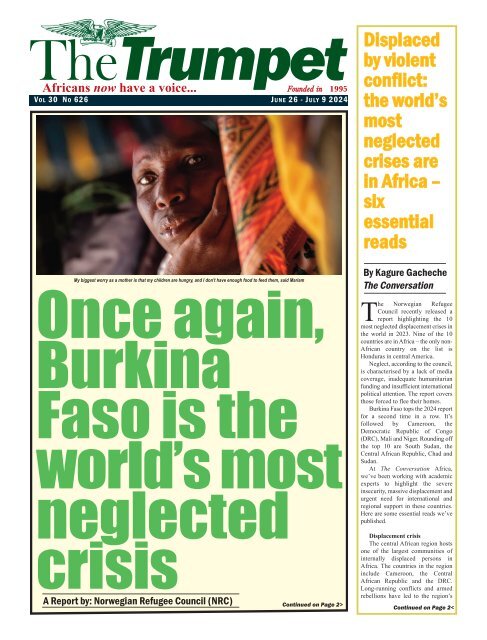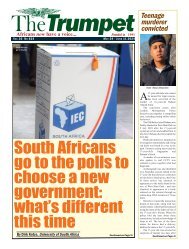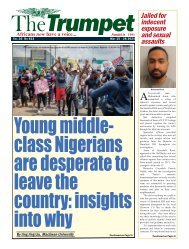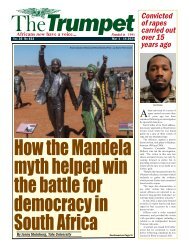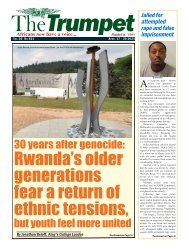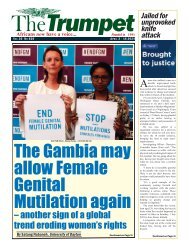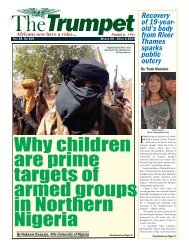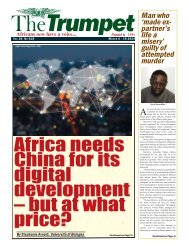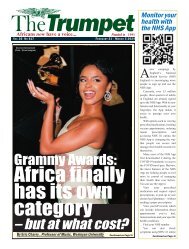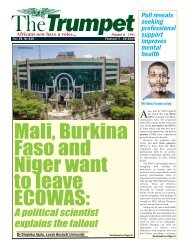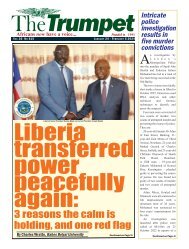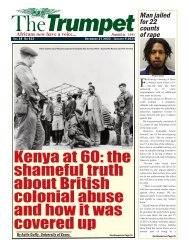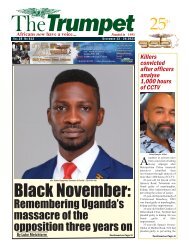The Trumpet Newspaper Issue 626 (June 26 - July 9 2024)
Once again, Burkina Faso is the world's most neglected crisis
Once again, Burkina Faso is the world's most neglected crisis
Create successful ePaper yourself
Turn your PDF publications into a flip-book with our unique Google optimized e-Paper software.
<strong>The</strong><strong>Trumpet</strong><br />
Africans now have a voice... Founded in 1995<br />
V O L 30 N O <strong>6<strong>26</strong></strong> J U N E <strong>26</strong> - JULY 9 <strong>2024</strong><br />
My biggest worry as a mother is that my children are hungry, and I don't have enough food to feed them, said Mariam<br />
Once again,<br />
Burkina<br />
Faso is the<br />
world’s most<br />
neglected<br />
crisis<br />
A Report by: Norwegian Refugee Council (NRC)<br />
Continued on Page 2><br />
Displaced<br />
by violent<br />
conflict:<br />
the world’s<br />
most<br />
neglected<br />
crises are<br />
in Africa –<br />
six<br />
essential<br />
reads<br />
By Kagure Gacheche<br />
<strong>The</strong> Conversation<br />
<strong>The</strong> Norwegian Refugee<br />
Council recently released a<br />
report highlighting the 10<br />
most neglected displacement crises in<br />
the world in 2023. Nine of the 10<br />
countries are in Africa – the only non-<br />
African country on the list is<br />
Honduras in central America.<br />
Neglect, according to the council,<br />
is characterised by a lack of media<br />
coverage, inadequate humanitarian<br />
funding and insufficient international<br />
political attention. <strong>The</strong> report covers<br />
those forced to flee their homes.<br />
Burkina Faso tops the <strong>2024</strong> report<br />
for a second time in a row. It’s<br />
followed by Cameroon, the<br />
Democratic Republic of Congo<br />
(DRC), Mali and Niger. Rounding off<br />
the top 10 are South Sudan, the<br />
Central African Republic, Chad and<br />
Sudan.<br />
At <strong>The</strong> Conversation Africa,<br />
we’ve been working with academic<br />
experts to highlight the severe<br />
insecurity, massive displacement and<br />
urgent need for international and<br />
regional support in these countries.<br />
Here are some essential reads we’ve<br />
published.<br />
Displacement crisis<br />
<strong>The</strong> central African region hosts<br />
one of the largest communities of<br />
internally displaced persons in<br />
Africa. <strong>The</strong> countries in the region<br />
include Cameroon, the Central<br />
African Republic and the DRC.<br />
Long-running conflicts and armed<br />
rebellions have led to the region’s<br />
Continued on Page 2
Page2 <strong>The</strong><strong>Trumpet</strong> JUNE <strong>26</strong> - JULY 9 <strong>2024</strong><br />
News<br />
Once again, Burkina Faso is the<br />
world’s most neglected crisis<br />
Map showing the world's most neglected crises 2023<br />
For the second year in a row, Burkina Faso is the<br />
world’s most neglected displacement crisis,<br />
according to a new report from the Norwegian<br />
Refugee Council (NRC). <strong>The</strong> normalisation of neglect is<br />
exacerbating needs and deepening despair.<br />
<strong>The</strong> annual list of neglected displacement crises is<br />
based on three criteria: lack of humanitarian funding,<br />
lack of media attention, and a lack of international<br />
political and diplomatic initiatives compared to the<br />
number of people in need.<br />
<strong>The</strong> crisis in Cameroon is listed second, having<br />
featured on the list every year since 2018. <strong>The</strong><br />
Democratic Republic of Congo, Mali, and Niger follow<br />
in this grim ranking, meaning that for the first time all<br />
three countries in the central Sahel are among the top<br />
five most neglected crises.<br />
“<strong>The</strong> utter neglect of displaced people has become<br />
Continued on Page 3<<br />
Displaced by violent conflict: the<br />
world’s most neglected crises are<br />
in Africa – six essential reads<br />
Continued from Page 1<<br />
instability. <strong>The</strong> main organisation<br />
providing assistance is the UN refugee<br />
agency. However, in a pattern seen for at<br />
least three years, the agency’s budget for<br />
the region remains insufficient. Cristiano<br />
d’Orsi highlights the urgent need for a<br />
coordinated and sustained international<br />
Solicitor and Partner<br />
of an award-winning<br />
law firm<br />
S.A.J<br />
LEGAL<br />
based in the heart of<br />
Central London -<br />
Kolade Jegede<br />
specializes in:<br />
Immigration - Preparing of all<br />
Immigration matters, including<br />
Appeal Challenges and Tribunal<br />
Representation.<br />
Employment - Handling all types<br />
of Employment Claims.<br />
Family Law - Dealing with Divorce<br />
Applications, Financial Arrangements,<br />
and Applying for Non-Molestation /<br />
Occupational Orders.<br />
First consultation is FREE.<br />
T: 07818 118656 E: kj@saj.legal<br />
response.<br />
Regional instability<br />
Armed groups like Boko Haram have<br />
been operating in the Lake Chad Basin<br />
for more than a decade. <strong>The</strong> region,<br />
which includes Niger, Cameroon and<br />
Chad, faces severe security challenges<br />
and many of the 30 million people living<br />
here need humanitarian assistance. More<br />
than 11 million have been displaced by<br />
conflict and need aid. Modesta<br />
Tochukwu Alozie proposes some<br />
solutions for a region whose population<br />
is expected to double in the next two<br />
decades.<br />
Decades of neglect<br />
Thirty years of violence in the DRC<br />
have left a trail of death, destruction and<br />
displacement. In recent months, however,<br />
a rebel insurgence in the eastern region<br />
has placed neighbouring Rwanda and<br />
Statutory Amendment (Date of Birth)<br />
I, Miss Adiatu Victoria Ramos - an Indigene of<br />
Lagos Island, Lagos State, Nigeria; known with a<br />
previous Date of Birth of 8th February 1970 wish<br />
to state that my correct Date of Birth<br />
is 8th February 1961.<br />
Nigeria High Commission London, Immigration &<br />
Nationality UK, Department of Social Security UK,<br />
Department for Work & Pensions, South<br />
Gloucestershire Council and NatWest Bank UK,<br />
should please take note<br />
Uganda at the centre of the country’s<br />
conflict. According to Jason Stearns and<br />
Joshua Z. Walker, donors and UN<br />
peacekeepers are providing humanitarian<br />
aid, but doing little to address the<br />
emerging conflict dynamics. <strong>The</strong>y<br />
explain why resolving the DRC crisis<br />
requires less hypocrisy from foreign<br />
donors, and an approach that prioritises<br />
the lives of civilians.<br />
Military takeover<br />
Niger is one of the poorest countries<br />
in the world and depends on foreign<br />
assistance. It’s also located in one of the<br />
most unstable parts of the world – the<br />
Sahel region, which is characterised by<br />
terrorism, banditry and trafficking.<br />
However, following a military coup in<br />
<strong>July</strong> 2023, the landlocked country of 25<br />
million people lost significant aid<br />
contributions. This has since resulted in<br />
a deterioration in security, economic<br />
development and people’s wellbeing.<br />
Olayinka Ajala unpacks the long-ranging<br />
implications of the military takeover in<br />
Niger.<br />
Escalating conflict<br />
Sudan was on a bumpy transition to<br />
democracy after the 2019 uprisings<br />
ousted long-time dictator Omar al-Bashir.<br />
But this came to a halt in April 2023 with<br />
the outbreak of a civil war. Hostilities<br />
have since spread beyond the capital<br />
Khartoum and revived long-simmering<br />
violence in Darfur. Around 25 million<br />
people – half of Sudan’s population<br />
before the war – are in need of urgent<br />
humanitarian assistance. <strong>The</strong> war is<br />
creating a volatile environment beyond<br />
Sudan’s borders, as May Darwich<br />
explains.<br />
Precarious peace<br />
South Sudan gained independence in<br />
2011 but remains extremely poor and<br />
underdeveloped. <strong>The</strong> country is reliant on<br />
oil exports for public revenue. This oil<br />
has to pass through Sudan to reach export<br />
markets. However, Sudan’s ongoing war<br />
poses a serious threat to Juba’s<br />
development efforts and an already<br />
precarious peace process. John Mukum<br />
Mbaku puts these risks into context.<br />
Kagure Gacheche is the<br />
Commissioning Editor, East Africa, at<br />
<strong>The</strong> Conversation.<br />
This article is republished from <strong>The</strong><br />
Conversation under a Creative Commons<br />
license. Read the original article at:<br />
https://theconversation.com/displacedby-violent-conflict-the-worlds-mostneglected-crises-are-in-africa-six-essenti<br />
al-reads-231768
News<br />
JUNE <strong>26</strong> - JULY 9 <strong>2024</strong><br />
<strong>The</strong><strong>Trumpet</strong><br />
Once again, Burkina Faso is the<br />
world’s most neglected crisis<br />
Page3<br />
Continued from Page 2<<br />
the new normal,” said Jan Egeland,<br />
Secretary General of NRC. “<strong>The</strong> local<br />
political and military elites disregard the<br />
suffering they cause, and the world is<br />
neither shocked nor compelled to act by<br />
stories of desperation and recordbreaking<br />
statistics. We need a global<br />
reboot of solidarity and a refocus on<br />
where needs are greatest.”<br />
This year’s list represents a continued<br />
race to the bottom. Scores that would<br />
have placed a country third on last year’s<br />
list leave it outside this year’s top ten.<br />
Across all three metrics we have seen a<br />
deepening of neglect, most starkly in the<br />
ongoing reduction of humanitarian<br />
funding. <strong>The</strong> lack of international<br />
support and attention is further<br />
compounded by the insufficient media<br />
freedom in many countries featured on<br />
this list.<br />
In 2023, the shortfall between<br />
humanitarian appeals and money<br />
actually received amounted to $32 billion<br />
- $10 billion higher than in 2022. That<br />
vast deficit meant 57 per cent of needs<br />
remained unmet. Whilst the funding gap<br />
is large, it is far from impossible to close.<br />
If each of the five most profitable listed<br />
companies worldwide contributed just<br />
five per cent of their 2023 profits, the<br />
funding gap could be matched in a<br />
second.<br />
“We urgently need investment for the<br />
world’s most neglected crises. <strong>The</strong>se<br />
investments must be made both in the<br />
form of diplomatic initiatives to get<br />
warring parties to come to the<br />
negotiating table, as well as funding<br />
commensurate with needs from donor<br />
countries,” said Egeland.<br />
“Critically, we need those economies<br />
not contributing their fair share of global<br />
solidarity to step up.”<br />
Far from the media spotlight, the<br />
crisis in Burkina Faso further worsened<br />
since topping the list last year. Violence<br />
killed more people and forced civilians<br />
to flee more times in 2023 than in any<br />
year since the conflict began in the<br />
country in 2019. Up to two million<br />
people are trapped in 39 blockaded<br />
towns across the country, leaving<br />
hundreds of thousands cut off from aid.<br />
“We have not received any assistance<br />
for a long, long time. In periods like this,<br />
when we do not have anything else to<br />
cook, I go and pick leaves and boil them<br />
in water. This pot will feed more than 10<br />
people in my family. This week we have<br />
only eaten leaves most days,” said<br />
Asseta, a displaced mother now living in<br />
Kongoussi, north Burkina Faso.<br />
“It is becoming increasingly hard to<br />
reach people in desperate need in<br />
Burkina Faso. Roads are too dangerous<br />
to use due to frequent attacks. <strong>The</strong><br />
minimal air service that exists cannot get<br />
anywhere close to meeting the scale of<br />
needs, and is also prohibitively<br />
expensive. It’s critical that donors and<br />
humanitarians continue to prioritise areas<br />
that are out-of-sight and ensure they do<br />
not become out-of-mind,” said Egeland.<br />
Facts and figures:<br />
• Each year, the Norwegian Refugee<br />
Council (NRC) publishes a list of the<br />
ten most neglected displacement<br />
crises in the world. <strong>The</strong> purpose is to<br />
focus on the plight of people whose<br />
suffering rarely makes international<br />
headlines, who receive no or<br />
inadequate assistance, and who never<br />
become the centre of attention for<br />
international diplomacy efforts. <strong>The</strong><br />
report is available at:<br />
https://www.nrc.no/resources/reports/<br />
t h e - w o r l d s - m o s t - n e g l e c t e d -<br />
displacement-crises-in-2023/<br />
• <strong>The</strong> full list in order this year is:<br />
Burkina Faso, Cameroon,<br />
Democratic Republic of Congo, Mali,<br />
Niger, Honduras, South Sudan,<br />
Central African Republic, Chad and<br />
lastly Sudan.<br />
• Burkina Faso has appeared on this list<br />
for the previous five years. It ranked<br />
first in last year’s report, second in<br />
2021, seventh in 2020, and third in<br />
2019.<br />
• Cameroon ranked 7th in 2022, 3rd in<br />
2021, 2nd in 2020 and topped the list<br />
in 2019 and 2018.<br />
• DR Congo topped the list three times<br />
(2021, 2020 and 2017). It ranked<br />
second on the list in 2022, 2019, 2018<br />
and 2016.<br />
• Sudan ranked 10th on the list having<br />
ranked 4th in 2022 and 7th in 2021.<br />
• <strong>The</strong> total funding to the Burkina Faso<br />
humanitarian response plan was $347<br />
million USD in 2023, of the $876<br />
million USD requested – making the<br />
response just 39.6% per cent funded<br />
(OCHA).<br />
• Conflict caused people to move<br />
707,000 times (internal<br />
displacements) in 2023, a 61%<br />
increase from 2022 (438,000)<br />
(IDMC). <strong>The</strong>re are around 2 million<br />
internally displaced people in the<br />
country. <strong>The</strong> number of Burkinabè<br />
refugees and asylum seekers jumped<br />
from 60,000 to 150,000 between<br />
December 2022 and December 2023<br />
(UNHCR).<br />
• Up to 2 million people, including 1.3<br />
million people in need, are living in<br />
blockaded areas, unable to access aid<br />
regularly (FONGIH and <strong>2024</strong> HNO).<br />
• <strong>The</strong> number of people killed in<br />
Burkina Faso doubled last year with<br />
over 8,400 deaths (ACLED).<br />
• <strong>The</strong> gap between the total<br />
humanitarian appeals by the UN and<br />
partners and the money received<br />
Continued on Page 4
Page4<br />
<strong>The</strong><strong>Trumpet</strong><br />
JUNE <strong>26</strong> - JULY 9 <strong>2024</strong><br />
<strong>The</strong><strong>Trumpet</strong> Group<br />
News<br />
Once again, Burkina<br />
Faso is the world’s<br />
Field: 07956 385 604<br />
E-mail:<br />
info@the-trumpet.com<br />
<strong>The</strong><strong>Trumpet</strong>Team<br />
PUBLISHER / EDITOR-IN-CHIEF:<br />
’Femi Okutubo<br />
most neglected crisis<br />
Continued from Page 2<<br />
world’s 5 most profitable companies<br />
are as follows: Saudi Aramco (247.43<br />
amounted to $32 billion in 2023 - $10<br />
BN USD), Apple (114.3 BN USD),<br />
billion higher than in 2022. This<br />
Berkshire Hathaway (Warren Buffett)<br />
means 57% of needs were unmet<br />
(100.3 BN USD), Microsoft 95.02<br />
(OCHA). <strong>The</strong> pre-tax income of the<br />
(BN USD), and Alphabet (Google<br />
parent company) (78.78 BN USD).<br />
This totals 635.83 billion USD. 5% of<br />
each of the companies' profits is equal<br />
to 31.8 BN USD (Statista).<br />
CONTRIBUTORS:<br />
Moji Idowu, Ayo Odumade,<br />
Steve Mulindwa<br />
SPECIAL PROJECTS:<br />
Odafe Atogun<br />
John-Brown Adegunsoye (Abuja)<br />
DESIGN:<br />
Xandydesigns@gmail.com<br />
ATLANTA BUREAU CHIEF:<br />
Uko-Bendi Udo<br />
3695 F Cascade Road #2140 Atlanta,<br />
GA 30331 USA<br />
Tel: +1 404 889 3613<br />
E-mail: uudo1@hotmail.com<br />
BOARD OF CONSULTANTS<br />
CHAIRMAN:<br />
Pastor Kolade Adebayo-Oke<br />
MEMBERS:<br />
Tunde Ajasa-Alashe<br />
Allison Shoyombo, Peter Osuhon<br />
<strong>The</strong><strong>Trumpet</strong> (ISSN: 1477-3392)<br />
is published in London fortnightly<br />
THINKING<br />
OF<br />
WRITING<br />
A BUSINESS<br />
PLAN?<br />
We can help you develop a<br />
professional business plan<br />
from only £250.<br />
For more information, contact us<br />
at 07402792146 or email us at:<br />
tolu.oyewole@consultant.com
JUNE <strong>26</strong> - JULY 9 <strong>2024</strong> <strong>The</strong><strong>Trumpet</strong><br />
Page5
Page6 <strong>The</strong><strong>Trumpet</strong> JUNE <strong>26</strong> - JULY 9 <strong>2024</strong><br />
News<br />
IDPs from the world’s most<br />
neglected crises<br />
Three internally displaced<br />
women in the Wendou camp.<br />
<strong>The</strong>y all come from Arbinda<br />
and have been living in the<br />
IDP camp since March 2021.<br />
For the second year in a<br />
row Burkina Faso is the<br />
world’s most neglected<br />
displacement crisis, according<br />
to a new report from the<br />
Norwegian Refugee Council<br />
(NRC). <strong>The</strong> normalisation of<br />
neglect is exacerbating needs<br />
and deepening despair.<br />
<strong>The</strong> annual list of neglected<br />
displacement crises is based<br />
on three criteria: lack of<br />
humanitarian funding, lack of<br />
media attention, and a lack of<br />
international political and<br />
diplomatic initiatives compared<br />
to the number of people in<br />
need.<br />
(Photo - Ousmane Drabo,<br />
NRC)<br />
Norwegian Refugee Council (NRC)<br />
Seceretary-General – Jan Egeland talks to<br />
Aissatou, an internally displaced woman from<br />
Arbinda who lives in the Wendou camp just<br />
outside Dori.<br />
“It is becoming increasingly hard to reach<br />
people in desperate need in Burkina Faso.<br />
Roads are too dangerous to use due to<br />
frequent attacks. <strong>The</strong> minimal air service that<br />
exists cannot get anywhere close to meeting<br />
the scale of needs, and is also prohibitively<br />
expensive. It’s critical that donors and<br />
humanitarians continue to prioritise areas that<br />
are out-of-sight and ensure they do not<br />
become out-of-mind,” said Egeland.<br />
(Photo - Ousmane Drabo, NRC)<br />
Asmao Bôka is an internally<br />
displaced woman who arrived in<br />
Torodi camp 4 months ago<br />
(February <strong>2024</strong>). She comes<br />
from the village of Gorom Gorom,<br />
another town in the Sahel located<br />
more than 100 kilometres from<br />
Dori. She was displaced to this<br />
town in the north of Burkina Faso<br />
after fleeing her home village of<br />
Kolel in 2022.<br />
“<strong>The</strong> last time we saw<br />
humanitarian aid here was 7<br />
months ago. I fled Gorom-Gorom<br />
with my children because there<br />
too, we hadn’t eaten and nothing<br />
has changed our condition until<br />
now.”<br />
“My life is now linked to the<br />
town of Dori. Even if the<br />
insecurity ends, I won’t go back<br />
to my home in Kolel.<br />
(Photo - Ousmane Drabo, NRC)<br />
Continued on Page 7
News<br />
JUNE <strong>26</strong> - JULY 9 <strong>2024</strong><br />
IDPs from the world’s most<br />
neglected crises<br />
<strong>The</strong><strong>Trumpet</strong><br />
Page7<br />
Continued from Page 6<<br />
Nafissatou is an IDP who has been living in Wendou camp since the end of<br />
2023. <strong>The</strong>re, she is making traditional Fulani mats for her family.<br />
(Photo - Ousmane Drabo, NRC)<br />
“It is becoming increasingly hard to reach people in desperate need in<br />
Burkina Faso. Roads are too dangerous to use due to frequent attacks. <strong>The</strong><br />
minimal air service that exists cannot get anywhere close to meeting the scale of<br />
needs, and is also prohibitively expensive. It’s critical that donors and<br />
humanitarians continue to prioritise areas that are out-of-sight and ensure they<br />
do not become out-of-mind,” said Egeland. (Photo – Ousmane Drabo, NRC)<br />
Burkina Faso - Mariam (Photo - Ingebjørg Kårstad, NRC)<br />
“My biggest worry as a mother is that my children are hungry, and I don’t have<br />
enough food to feed them. Sometimes they are crying because they are so hungry,<br />
and it breaks my heart. <strong>The</strong>y don’t grow like they used to do in our village. <strong>The</strong>y are<br />
losing weight, and so am I. Some days I skip my meal to save a small portion for<br />
them for the evening. I used to be a beautiful woman, but look at me now. I’m<br />
hungry all the time. It’s hard”, said Mariam.<br />
Mariam has been in Kongoussi, northern Burkina Faso, for less than a year.<br />
She is cooking a small portion of corn for her five children and husband. <strong>The</strong>y only<br />
have resources to make one meal per day, and this small pot of corn is all the<br />
whole family will eat all day.<br />
<strong>The</strong>y have one tiny shelter that is really too small for them all to fit inside, but<br />
now that the rainy season start, they can no longer sleep outside. Now they all<br />
cram together in that space that also has their few personal belongings in it. <strong>The</strong>y<br />
have made small “walls” on the ground to stop the rain from flowing in.<br />
“<strong>The</strong> biggest challenge as a displaced is the tiny shelter and the fact that we are<br />
unable to get enough food to eat,” Mariam says.<br />
“It’s not possible to go back. <strong>The</strong> village is under control by the armed groups,<br />
so we have to stay here.”<br />
Burkina Faso - Asseta (Photo - Ingebjørg Kårstad, NRC)<br />
“We have not received any assistance for a long, long time. In periods like this,<br />
when we do not have anything else to cook, I go and pick leaves and boil them in<br />
water. This pot will feed more than 10 people in my family. This week we have only<br />
eaten leaves most days,” said Asseta, a displaced mother now living in Kongoussi,<br />
northern Burkina Faso.<br />
Collecting leaves for consumption is not at all an uncommon way for people to<br />
survive at this point in time in Burkina Faso.<br />
<strong>The</strong> total funding to the Burkina Faso humanitarian response plan was $347<br />
million USD in 2023, of the $876 million USD requested – making the response just<br />
39.6% per cent funded (OCHA).<br />
Continued on Page 8
Page8 <strong>The</strong><strong>Trumpet</strong> JUNE <strong>26</strong> - JULY 9 <strong>2024</strong><br />
News<br />
IDPs from the world’s most<br />
neglected crises<br />
Continued from Page 8<<br />
Cameroon - Harouna<br />
Harouna and his family have<br />
lived for more than 10 years in<br />
eastern Cameroon since they fled<br />
unrest in Central African Republic.<br />
Aid has gradually diminished,<br />
making them feel forgotten. (Photo -<br />
Patricia Pouhe, NRC)<br />
Cameroon - Area where<br />
people collecting firewood<br />
(Photo - Ingrid Prestetun, NRC)<br />
Burkina Faso - Ousmane<br />
“One day the militia came and told us they don’t want to see anybody left in<br />
this village by tomorrow this time. <strong>The</strong>y forced me to come with them and I was<br />
badly beaten. Really badly. I was not the only one they kidnapped. <strong>The</strong>re were<br />
three other men with me. My brothers and my neighbour. We were lucky and<br />
were released after a while, but our neighbour was killed. His body was found<br />
after a couple of days”, Ousmane told us. He fled from Yamba, a village in<br />
eastern Burkina Faso in March 2023 and found safety in Fada, the provincal<br />
capital.<br />
“Life at home was really good. We had our farm where we cultivated millet<br />
and corn and we also had animals. In addition, I bought and sold millet to earn<br />
extra income for the family. Here in Fada, we find it really difficult to survive. Jobs<br />
are scarce with all the newly displaced that have arrived here. Last rainy season<br />
I negotiated access to a plot of land where I could farm a bit, but it was still not<br />
enough to get by,” says Ousmane.<br />
“Our message to the world is we really need support. Without our farming<br />
land we are struggling. We only eat a little twice a day. When our children get<br />
sick, we have no extra money to buy them medicine or even to pay for the<br />
school lunches to keep them in school.” (Photo - Ingebjørg Kårstad, NRC)<br />
Cameroon - Salamatou<br />
Growing up as a refugee has not<br />
been easy for Hamayadji Salamatou, 29<br />
years old. In 2006, when she was just<br />
ten years old, Salamatou was forced to<br />
leave her village in the Central African<br />
Republic with her family following<br />
episodes of violence. “I don’t remember<br />
exactly what happened, but I do<br />
remember that I was very scared<br />
because it was during the night that we<br />
fled,” she says. Arriving in the East<br />
region of Cameroon with her family, they<br />
first settled in Kentzou, before moving<br />
to Nyabi where, thanks to a smooth<br />
integration, she has built a home with<br />
her husband and 03 children few years<br />
later.<br />
As many other CAR refugees living<br />
in Cameroon, Salamatou is facing<br />
various challenges among which access<br />
to a dignified shelter or education for her<br />
children. She says “My children can’t<br />
even go to school because I can’t afford<br />
to send them, and they don’t even have<br />
birth certificates. But I have hope for the<br />
future, God can’t forget us forever! I<br />
know that my life is already over, but my<br />
biggest dream is to see my children<br />
going to school so that they can have a<br />
better life than mine and become great<br />
people.”<br />
She has not received any assistance<br />
from NRC.<br />
(Photo Ingrid Prestetun, NRC)<br />
Continued on Page 9
News<br />
IDPs from the world’s most<br />
neglected crises<br />
JUNE <strong>26</strong> - JULY 9 <strong>2024</strong><br />
<strong>The</strong><strong>Trumpet</strong><br />
Page9<br />
Continued from Page 8<<br />
DR Congo<br />
1.7 million Congolese are internally displaced in the Ituri province and the<br />
Plaine Savo idp camp is one of several camps outside the village of Bule.<br />
<strong>The</strong> majority of idp’s in the Plaine Savo camp fled their homes after attacks on<br />
several villages between 10 and 13 <strong>June</strong> 2019.<br />
In the eastern Congo, the provinces of Ituri, North Kivu, South Kivu and<br />
Tanganyika there are over 150 armed groups. Attacks and armed clashes have<br />
forced more than 3.3 million people to flee. This is more than 80% of the<br />
population in the area. ( Photo: Beate Simarud/NRC)<br />
Mali - In the village of Tombonka in central Mali, Fatoumata, draws water from a<br />
borehole to water her newly planted crop. Access to land is a challenge,<br />
particularly for displaced women. Photo: Ousmane Drabo, NRC<br />
DR Congo<br />
During the first months of 2023, recurring attacks hit villages in North Kivu<br />
province, forcing thousands of people to flee towards Goma, the province<br />
capital. Many found shelter in and around schools. Photo: Beate Simarud/NRC<br />
Niger - Widespread insecurity and a lack of funding have led to a dramatic increase<br />
in school closures in Tillaberi, Niger, barring children from learning and leaving<br />
them without a much-needed support network. Photo: Tom Peyre-Costa, NRC<br />
DR Congo - Ndamukunzi<br />
Ndamukunzi is an old women<br />
between 80 and 90 years old. <strong>The</strong><br />
exact age she doesn’t know. But her<br />
hands are as weathered as time<br />
itself.<br />
Ndamukunzi, her son, his wife<br />
and their eight children fled the<br />
village of Rogani and arrived<br />
Kanyaruchinya in March last year.<br />
Her husband fell ill and died in<br />
January last year.<br />
Now they are located at a school<br />
in Kanyaruchinya, a site for internally<br />
displaced people. <strong>The</strong> site is located<br />
outside the provincial capital of<br />
Goma in North Kivu, eastern Congo.<br />
Photo: Beate Simarud/NRC<br />
Honduras - Margarita - Margarita had a successful business. <strong>The</strong>n, her daughter<br />
was raped. “<strong>The</strong> truth is, none of us go out. <strong>The</strong> children don’t go out either,” she<br />
says.<br />
Margarita’s mother Marina explains the pervasive nature of violence and<br />
lawlessness: “Here the law is the law of the strongest, of the one who has<br />
money,” she says.<br />
“For a poor person there is no law. We live locked up in our neighbourhoods, and<br />
the gangs have humiliated us. We can’t speak, we can’t go out. You can’t say<br />
anything at all because then they tell you you have 24 hours to leave your<br />
house. Don’t trust anyone. I don’t trust anyone.” Photo: Ingrid Prestetun, NRC<br />
Continued on Page 10
Page10 <strong>The</strong><strong>Trumpet</strong> JUNE <strong>26</strong> - JULY 9 <strong>2024</strong><br />
News<br />
IDPs from the world’s most<br />
neglected crises<br />
Continued from Page 9<<br />
South Sudan - South Sudanese returnees are offered the opportunity to<br />
travel onwards in South Sudan. <strong>The</strong> easiest way of moving the returnees is by<br />
boat down the White Nile. (Photo - Richard Ashton, NRC)<br />
Chad - Mariam - NRC Secretary General - Jan Egeland meets a family from<br />
Geneina that was attacked by Arab militias. <strong>The</strong> father, Ahmed, 37, is now<br />
helping fellow refugees. <strong>The</strong> mother is called Mariam, 24, sons Abdulkadir, 6,<br />
Hussein, 5, and three-month-old baby Ibrahim born in Adré Settlement.<br />
“I was two months old pregnant when armed men came and burst through our<br />
door, looking for my husband to kill him,” Mariam said. Her husband was away<br />
but when he returned home they were still there.<br />
“I convinced them we were not Masalit”, Ahmed said, referring to their ethnic<br />
community that was under attack. “<strong>The</strong>y were killing Masalit men, they just<br />
wanted to wipe us out, but we convinced them we were from another tribe and<br />
we managed to get away from there, crossing to Chad,” he said.<br />
Mariam was studying public health in Sudan hoping to become a nurse.<br />
“I’ve lost everything,” she said. “I wish I can continue my studies but we are cut<br />
off from everything here.”<br />
*Names have been changed to protect their identities.<br />
(Photo - Karl Schembri, NRC)<br />
Central African Republic - Rachel<br />
Rachel does the dishes after making a meal for her family in Bimon, Central<br />
African Republic. (Photo - Marion Guenard, NRC)<br />
Sudan - Awadia<br />
Awadia has spent a life of displacement throughout Sudan. Now she is displaced<br />
again in White Nile province after fleeing the violence in the capital Khartoum.<br />
(Photo - Ahmed Omer, NRC)<br />
STALLIONS AIR<br />
Ipanema Travel Ltd<br />
AFRICA FLIGHTS<br />
SPECIALISTS<br />
LAGOS fr £477<br />
(2 Bags)<br />
020 7580 5999<br />
07979 861 455<br />
Call AMIT / ALEX<br />
73 WELLS ST, W1T 3QG<br />
All Fares Seasonal<br />
ATOL 9179<br />
It pays to Advertise in<br />
<strong>The</strong> <strong>Trumpet</strong> Call<br />
020 8522 6600 or<br />
email: adverts@thetrumpet.com
JUNE <strong>26</strong> - JULY 9 <strong>2024</strong><br />
<strong>The</strong><strong>Trumpet</strong><br />
Page11<br />
Produced in Association with HM Government<br />
It’s never too late to tackle addiction<br />
If you or someone you know is having issues<br />
with drugs or alcohol, there are lots of ways<br />
to access free & confidential advice and<br />
support from local experts<br />
Drug and alcohol problems<br />
can affect anyone, with<br />
many people keeping it a<br />
secret, adding pressure to holding<br />
down a job and juggling family<br />
life. This can have a serious<br />
impact on the people around you,<br />
including those you love.<br />
Whether you’ve become<br />
dependent on drugs and alcohol,<br />
or just find it difficult to control<br />
your use, it can be difficult to<br />
acknowledge and talk about what<br />
is happening.<br />
But it’s important to remember<br />
that effective, confidential, and<br />
non-judgemental help is available<br />
for anyone who feels they, or<br />
anyone they know, struggles with<br />
alcohol or drugs. Support is also<br />
available for families affected by a<br />
loved one’s alcohol and drug<br />
use.<strong>The</strong> government is investing<br />
additional funding to improve the<br />
capacity and quality of treatment.<br />
This means that there will be<br />
more help available in your local<br />
area so you can get the help you<br />
need quicker and the help you<br />
receive will be better, including<br />
from better-trained staff who can<br />
spend longer with each person.<br />
“You’ve got to<br />
do it for yourself,<br />
or nothing is<br />
going to change”<br />
*Aleena (name changed for<br />
privacy), 37, has lived through<br />
some challenging times. Her<br />
father was killed in a road<br />
accident when she was 11 years<br />
old, triggering her to go “off the<br />
rails” as she went into a spiral of<br />
drug and alcohol use.<br />
When she became pregnant in<br />
late 2020, she reached a crisis<br />
point and approached her local<br />
drug and alcohol treatment<br />
provider for support.<br />
“When I was pregnant, I<br />
thought enough is enough, and<br />
became determined to change my<br />
ways and surroundings. <strong>The</strong><br />
penny had dropped,” says<br />
*Aleena.<br />
“I was a mess when I walked<br />
into drug and alcohol support<br />
services and now, I’m more<br />
confident and have my selfesteem<br />
back. I don’t have cravings<br />
and I’ve got the willpower to carry<br />
on.<br />
“<strong>The</strong> talking support groups<br />
are intense, but they have got to be<br />
intense to work. It opens your<br />
eyes to a lot of stuff - especially<br />
what you thought was normality.<br />
“I told my life story over six<br />
months, from childhood to now.<br />
You’re encouraged to open up to<br />
your key worker and once it is off<br />
your chest, you can put it in a box<br />
and forget about it.<br />
“I can’t thank my service<br />
provider enough. My key workers<br />
took the time to sit down with me<br />
and make me feel a lot better<br />
about myself. <strong>The</strong>y are like my<br />
family and have been excellent<br />
with me and my little girl.<br />
“You’ve got to do it for<br />
yourself, or nothing is going to<br />
change. Even if you’re proud. I<br />
didn't want to ask for help, but you<br />
need it. Grab it with both hands<br />
and give it a go. <strong>The</strong>n stay calm<br />
and keep focused and busy. If<br />
you’re bored, your mind starts<br />
wandering. You need a routine<br />
and structure.”<br />
With a fresh start, *Aleena is<br />
now raising her daughter and<br />
continues to rebuild her life. She<br />
is also still in touch with her local<br />
treatment service, who continue to<br />
offer support.<br />
How to find help<br />
You can find details of treatment services on your<br />
local authority’s website. FRANK also has a<br />
directory of adult and young people’s alcohol and<br />
drug treatment services at talktofrank.com/help<br />
If you are worried about a friend or family<br />
member and they are happy for you to do so,<br />
contact FRANK, or the local drug and alcohol<br />
service on their behalf . You, or the person you<br />
are worried for can call FRANK anytime on 0300<br />
123 6600 for confidential advice and information.<br />
You can talk to your GP, who can then refer you<br />
to services, but if you are not comfortable doing<br />
that you can approach your local drug and<br />
alcohol treatment service yourself without a<br />
referral or a friend or family member can, contact<br />
the local service on your behalf.<br />
Remember that expert help is out there. Treatment<br />
is available for anyone who is dependent on drugs<br />
or alcohol. Staff in the local service will talk you<br />
through all of your personal treatment options and<br />
agree on a plan with you.<br />
Community support alongside treatment<br />
<strong>The</strong>re are also lots of groups within the community<br />
of people in recovery that offer support, including<br />
Alcoholics Anonymous, Cocaine Anonymous,<br />
Narcotics Anonymous and UK SMART<br />
Recovery - and, for families and friends, Al-Anon<br />
and Families Anonymous.<br />
<strong>The</strong>se self-helps groups can provide a vital source<br />
of support, alongside the help provided by the<br />
local treatment service.<br />
You can call FRANK anytime on 0300 123 6600<br />
for confidential advice and information.<br />
Help is at hand: Scan to reach out to the nation’s<br />
drug and alcohol advisory service FRANK
Page12 <strong>The</strong><strong>Trumpet</strong> JUNE <strong>26</strong> - JULY 9 <strong>2024</strong><br />
<strong>The</strong>Trump et<br />
Africans now have a voice... Founded in 1995<br />
SUBSCRIBE to the authentic newspaper<br />
focusing on Africa and Friends of Africa.<br />
<strong>The</strong> <strong>Trumpet</strong> <strong>Newspaper</strong> which was<br />
established in 1995 has over the years grown<br />
to be the <strong>Newspaper</strong> of choice and voice for<br />
Diaspora Africans.<br />
It also has a readership among Africans on<br />
the Continent who want to connect and<br />
keep up with Diaspora Africans; and Friends<br />
of Africa who want to connect and keep up<br />
with Africa.<br />
We are pleased to offer more choices to read<br />
<strong>Trumpet</strong> <strong>Newspaper</strong> via Subscription to our<br />
Digital edition or Print edition (or both).<br />
As a paid Subscriber, you will enjoy:<br />
• Priority and Direct delivery of every<br />
fortnightly issue to you (Digital - via email<br />
and Print via Post).<br />
• Occasional exclusive offers and event<br />
invitations (subject to availability).<br />
Our Subscription Rates vary according to<br />
where you are in the world: UK, Europe<br />
or Rest of the World.<br />
You can Subscribe online at:<br />
<strong>Trumpet</strong>MediaGroup.com/Shop<br />
or complete the form below.<br />
I / We wish to subscribe to<br />
<strong>Trumpet</strong> <strong>Newspaper</strong> until further notice:<br />
Name:<br />
Rates and options ( Tick ✔)<br />
Address:<br />
Email:<br />
Tel No:<br />
I/We made a payment of £ on (date) into<br />
your Bank Account: Account Name: Target Today Ltd.<br />
Sort Code: 20 32 00<br />
Account No: 03946231<br />
I am / We are enclosing cheque for £<br />
Target Today Ltd.<br />
made payable to<br />
Signature:<br />
I / We have sent a payment of £<br />
targettoday@the-trumpet.com<br />
via Paypal to<br />
Date:<br />
Please send me a Stripe Payment Link<br />
Return Subscription Form by Email: info@the-trumpet.com<br />
or Post: <strong>Trumpet</strong> Media, 3rd Floor, 86 - 90 Paul Street, London EC2A 4NE
JUNE <strong>26</strong> - JULY 9 <strong>2024</strong> <strong>The</strong><strong>Trumpet</strong><br />
Page13
Page14 <strong>The</strong><strong>Trumpet</strong><br />
<strong>The</strong>Arts News & Entertainment<br />
JUNE <strong>26</strong> - JULY 9 <strong>2024</strong><br />
Bab L’ Bluz releases new album<br />
‘Swaken’<br />
Words by Jane Cornwell<br />
Welcome, then, to the world of<br />
Swaken, the highly anticipated<br />
second album by French-Moroccan power<br />
quartet, Bab L’ Bluz. Recorded at Real<br />
World Studios in Wiltshire, England, written<br />
partly in Morocco - the birthplace of frontwoman<br />
Yousra Mansour - and mostly across<br />
a world tour that took them from Adelaide,<br />
Barcelona and New York to Essaouira in<br />
Morocco, Lomé in Togo and Dougga in<br />
Tunisia. Eleven tracks that spark and pulse<br />
with kinetic, pedal-to-the-metal energy.<br />
Mansour’s melismatic voice has never<br />
sounded so forceful, or the riffage from her<br />
electric awisha lute so mighty. Her<br />
bandmates (on everything from keyboards,<br />
flutes and electric guembri to drums,<br />
backing vocals and qraqeb castanets) now<br />
interact with what might be telepathy, their<br />
playing skilled and tight.<br />
This is ancient-to-future music, rooted<br />
as much in psychedelic blues, funk and rock<br />
as in the trancey, propulsive rhythms of<br />
northern Africa’s Maghreb: Gnawa,<br />
Amazigh, Hassani and Houara music. <strong>The</strong><br />
popular street music known as Chaabi, in<br />
which the word ‘swaken’ means to visit<br />
another dimension, as well as the space in<br />
which two dimensions overlap.<br />
Losing yourself to find yourself is a<br />
central tenet of Swaken, an album whose<br />
warm analogue sound nods to such ‘70s<br />
rock icons as Jimi Hendrix, Led Zeppelin<br />
and Nass El Ghiwane, Morocco’s very own<br />
Rolling Stones, social justice warriors who<br />
mixed Western rock and folk with a trance<br />
aesthetic influenced - as is that of Bab L’<br />
Bab L Bluz - Photo Crédit Samadoss Maitoul<br />
Bluz - by Gnawa lilas, the all-night healing<br />
rituals intended for sacred spirit possession.<br />
“Constant touring means we have grown<br />
in confidence and power,” says Mansour of<br />
the band she co-founded in 2018 with<br />
French guitarist, bass guembri lute player<br />
and multi-instrumentalist Brice Bottin, who<br />
co-produced Swaken in the Wood Room at<br />
Real World Studios with the latter’s Katie<br />
May.<br />
“We adapted our sound for festival<br />
crowds, made it heavier, rockier. We added<br />
Bab L Bluz - Photo Credit Brice Bottin 4 March <strong>2024</strong><br />
more instruments. More courage. More<br />
fire.”<br />
Back in 2020 Bab L’ Bluz opened the<br />
gate - to the blues, to a new way of being -<br />
with their debut album Nayda! Named for<br />
Morocco’s revolutionary youth movement<br />
of artists and musicians, whose philosophies<br />
(community, creativity, change) the band<br />
strives to embody, Nayda! won plaudits<br />
from Le Monde, Vogue Arabia and the New<br />
York Times, and clinched the 2021<br />
Songlines Award in the Fusion category.<br />
Bab L’ Bluz have gone on to fold<br />
electric mandole and electric ribab (the<br />
single-stringed bowed violin vital to<br />
Amazigh/Berber culture) into their<br />
message-driven wig outs. A luthier, not far<br />
from their hometown of Lyon, France<br />
fashioned the doubleneck awisha/mandole<br />
guitar (three single strings on one neck/five<br />
double strings on the other) from which<br />
Mansour now fires her lightning-bolt riffs.<br />
“<strong>The</strong> ribab feels so mystical, and there<br />
are even less women playing ribab than the<br />
[awisha] guembri,” she says, and smiles.<br />
“And there are probably no women playing<br />
them both, electrified, at the same time.”<br />
“We love the rock energy,” says Bottin,<br />
who also wields dub sirens and plays guitar,<br />
banjo, percussion and West Africa’s peul<br />
flute. “You plug in your instrument and you<br />
drive people crazy. Rock came from blues.<br />
Both are related to trance music. You can<br />
listen deeply, or headbang, and be<br />
completely taken over.”<br />
While hundreds of thousands of people<br />
around the globe have abandoned<br />
themselves to the band’s intense, hypnotic<br />
wall of sound, success has also brought out<br />
the haters. Having worked hard and gone<br />
big, Bab L’ Bluz - which also features<br />
Ibrahim Terkemani, Mehdi Chaib and<br />
Jérôme Bartolome - have, when required,<br />
pushed back.<br />
“We have huge crowds cheering us on,”<br />
says Mansour, one of five daughters raised<br />
by a widowed single mother, a science<br />
teacher with a strong sense of self-worth.<br />
“Some of those people are fighting the same<br />
fight. But there are still times when we are<br />
confronted with outdated attitudes; for<br />
example, after we played the Gnawa<br />
Festival in Essaouira last year, a famous<br />
Moroccan newspaper ran an online review<br />
praising the empowered female performers,<br />
and it received an avalanche of toxic<br />
comments.”<br />
A shrug. “Which only makes me more<br />
determined to express everything I feel. I<br />
will not censor myself.”<br />
For the most part, Mansour writes and<br />
sings in Darija, her Moroccan-Arabic<br />
dialect, and the preferred language of the<br />
Nayda movement (‘nayda’ means ‘up’ in<br />
Darija). On Swaken she confronts such<br />
contentious topics as Moroccan inheritance<br />
laws, gender wage disparities and rising<br />
cases of suicide and depression while<br />
calling for unity, tolerance and kindness in<br />
an increasingly fragile world.<br />
Arrangements co-written with Bottin<br />
revel in deftly applied distortion and reverb,<br />
and sparkle with quarter-tones found in<br />
North and West African and some Middle<br />
Eastern scales. “This discovery opened<br />
another gate to musical opportunities,” says<br />
Bottin.<br />
Swaken opens with ‘Imazighen’, a<br />
rollicking celebration of the richness of<br />
ethnic diversity. <strong>The</strong> song’s refrain (‘We<br />
(North African natives) are all true<br />
Amazighs‘) is sung in Tamazight, the<br />
language of the Amazigh Berbers,<br />
Mansour’s ancestors. “In the past the<br />
Amazigh people were discouraged from<br />
speaking their language, and were derided<br />
by many [classical] Arabic-speakers,” she<br />
says. “Today this is changing. <strong>The</strong> language<br />
is taught in schools, and young people are<br />
reclaiming and celebrating their Amazigh<br />
roots.”<br />
Variously inspired by Gnawa music, the<br />
lamenting Aita folksong of the west-central<br />
Moroccan countryside and the Ahwach<br />
collective performance tradition of southern<br />
Morocco, ‘Wahia Wahia’ is a rallying cry<br />
for solidarity; a diorama in which drums<br />
crash, effects echo, voices weave and<br />
portals open. ‘Zaino’ reimagines the poetic<br />
Hassani love songs of southern<br />
Morocco/Mauritania via pentatonic<br />
melodies, a sinewy Ethiopian flavour and<br />
that fierce all-stops-out rock. “It’s about the<br />
fight for women’s freedom of expression,”<br />
says Mansour, “as well as a love letter to<br />
beauty and kindness.”<br />
Music from north-east Morocco and<br />
influences from Tunisia and Algeria feed<br />
‘AmmA’ [sic], a track infused with flutes,<br />
percussion and looping chords, and where<br />
Mansour’s passionate ululations underscore<br />
a warrior vibe that recalls the traditional<br />
Maori haka war dance. “Awaken,<br />
women/Rise, women/I am not half a<br />
man/That time is over,“ she declaims, railing<br />
against the oppression found in archaic<br />
systems. “Everyone, repeat after us...”<br />
A reversed peul flute intro, and<br />
‘Bangoro’ gathers pace until it morphs into<br />
an electro-yelping, ‘70s riffing, psychedelic<br />
blues-rock excursion that veers into West<br />
Africa; ‘IWAIWA FUNK’ is played on<br />
electric mandole, sung in the higher-pitched<br />
vocal style found in Morocco’s High Atlas<br />
mountains, and themed to remind us that life<br />
is short, resentment is futile and dance -<br />
whirling, hair-whipping dance - is a conduit<br />
to the soul.<br />
‘Ya Leilo’ is a fragrant mix of Gnawa<br />
and Hassani music, Mauritanian rock,<br />
loping Tuareg rhythms and the percussive<br />
Houara music from Taroudant in south<br />
western Morocco. ‘Hezalli’, Swaken‘s only<br />
non-original tune, is a sublime traditional<br />
Jewish Yemenite song written by Mutahhar<br />
Ali Al-Eriyani: “I used to sing this song a<br />
Continued on Page 15>
<strong>The</strong>Arts & Entertainment<br />
JUNE <strong>26</strong> - JULY 9 <strong>2024</strong> <strong>The</strong><strong>Trumpet</strong> Page15<br />
Bab L’ Bluz releases new album ‘Swaken’<br />
Continued from Page 14<<br />
long time ago,” says Mansour, who plays<br />
electric mandole throughout. “I thought<br />
about the difficulties Yemen is facing, and<br />
the culture that the tribes from Yemen<br />
maybe brought to Morocco.”<br />
<strong>The</strong> heavyweight ‘Karma’ is a song<br />
about what goes around, comes around, its<br />
Arabo-Andalusian influences piqued by the<br />
numerous gigs that Bab L’ Bluz have played<br />
in Spain, its healing powers hinted at by<br />
esoteric [Moroccan Sufi] Aissawa vibes, its<br />
import emphasised by Mansour’s cracking,<br />
amped-out voice: “Katie [May] used a big<br />
overdrive on this,” she says. “<strong>The</strong>se are big<br />
words that I’m singing.”<br />
‘Li Maana’ is a fighting song, fuelled by<br />
ribab/awisha, that advocates for a better,<br />
more tolerant society - in Morocco, the<br />
Maghreb, the world - while name-checking<br />
strong female figures including Aicha<br />
Kendicha, a fabled prostitute who resisted<br />
colonisation by killing Portuguese colonists<br />
and over centuries has been subsumed, a<br />
scary djinniya (female djinn), into<br />
Moroccan folklore, and Dihya al-Kahina, an<br />
Amazigh/Berber princess-warrior who led<br />
indigenous resistance to early Muslim<br />
conquests of the Maghreb.<br />
‘Mouja’ (‘Wave after wave’), the<br />
album’s AC/DC-style closer, uses a<br />
guitar/guembri riff and hard-hitting Darija<br />
lyrics to confront the overwhelm that so<br />
many of us experience daily, what with<br />
negative events and existential threats<br />
assaulting our senses, and harmful lifestyles<br />
- forced and/or chosen - compounding<br />
problems further. “We are living and<br />
consuming as if we’re running out of time,<br />
and have lost sight of who we are, of what<br />
matters,” says Mansour. “We need to<br />
appreciate the life we are living now.”<br />
Music helps.<br />
Music that makes you forget to<br />
remember, that takes you over, sends you<br />
under, into a place of clarity and connection.<br />
A place that shakes us up, to bring us peace.<br />
This is Swaken. Let’s meet each other<br />
there.<br />
GLOSSARY<br />
Swaken (origin: Moroccan Darija) -<br />
possessions, haunting, transcendence.<br />
Spirits inhabiting humans.<br />
Electric Guembri - the three-stringed<br />
bass-lute from Morocco<br />
Electric Awisha – a small guembri lute<br />
from Morocco<br />
Qraqeb - iron castanet-like musical<br />
instrument primarily used as the rhythmic<br />
aspect of Gnawa music<br />
Gnawa - the centuries old Moroccan<br />
spiritual practice<br />
Amazigh - Berbers or the Berber<br />
peoples, also called by their contemporary<br />
self-name Amazigh or Imazighen. A diverse<br />
grouping of distinct ethnic groups<br />
indigenous to North Africa<br />
Hassani -is a traditional Mauritanian<br />
music, which is also found in southern<br />
Morocco and certain neighbouring regions,<br />
Sport<br />
Exciting Guinea out to make a<br />
splash in Paris<br />
and is also the name of one of the mains<br />
Arab dialects spoken in Mauritania<br />
Houara - Arab-Berber tribal<br />
confederation in the Maghreb<br />
Lilas - the all-night healing rituals<br />
intended for sacred spirit possession.<br />
Electric mandole – steel string fretted<br />
instrument resembling a mandolin<br />
Electric ribab - single-stringed bowed<br />
violin vital to Amazigh/Berber culture<br />
Peul flute - a three-hole flute made of<br />
reed and beeswax,<br />
Darija - Moroccan-Arabic dialect<br />
Nayda - ‘up’ in Darija<br />
Tamazight - the language of the<br />
Amazigh Berbers<br />
Aita - a popular Bedouin musical style<br />
that originates from the countryside of<br />
Morocco<br />
Djinniya (female djinn) - an intelligent<br />
spirit able to appear in human and animal<br />
forms and to possess humans.<br />
Guinea will return to the Men’s Olympic Football Tournament after a 56-year absence.<br />
FIFA profiles their team and coach.<br />
By FIFA.com<br />
Ilaix Moriba<br />
After suffering shootout heartbreak<br />
against Mali in the match for third<br />
place at the CAF U-23 Africa Cup<br />
of Nations, Guinea ultimately secured their<br />
spot at the Men’s Olympic Football<br />
Tournament courtesy of a 1-0 win over<br />
Indonesia in May’s intercontinental playoff.<br />
<strong>The</strong>y were the last of the 16 nations to<br />
book their spot at Paris <strong>2024</strong>, ending a 56-<br />
year Olympic wait in the process. In a twist<br />
of fate, the West Africans will line up<br />
against France, just as they did at Mexico<br />
’68, in a rather daunting-looking Group A.<br />
Over half a century on from Guinea’s first<br />
– and only – Olympic campaign, Kaba<br />
Diawara’s troops head to the French capital<br />
intent on leaving their mark on the <strong>2024</strong><br />
edition. Spearheaded by a promising crop<br />
of exciting talent that includes Ilaix Moriba,<br />
whose first-half spot kick sealed the deal<br />
against the Indonesians, and Olympiacos<br />
pair Aguibou Camara and Algassime Bah,<br />
the Guineans are determined to live up to<br />
the expectations of those back home.<br />
Guinea’s Group A fixtures<br />
All kick-offs in local time<br />
Wednesday, 24 <strong>July</strong> Guinea v New<br />
Zealand | 17:00 | Stade de Nice<br />
Saturday, 27 <strong>July</strong> France v Guinea |<br />
21:00 | Stade de Nice<br />
Tuesday, 30 <strong>July</strong> USA v Guinea | 19:00<br />
| Stade Geoffroy-Guichard, Saint Etienne<br />
<strong>The</strong> coach: Kaba Diawara<br />
“We’ll be going there to try to get as far<br />
as possible. We’re rewriting the history<br />
books with these youngsters ,” commented<br />
Diawara moments after having seen his<br />
side clinch their Paris <strong>2024</strong> berth. <strong>The</strong><br />
former Guinean international’s post-match<br />
reaction served as a clear statement of<br />
intent from a man set to accomplish a career<br />
Kaba Diawara (Photo - CCA-SA 3.0 Unported)<br />
dream of coaching at the Games. <strong>The</strong><br />
Toulon-born tactician, who also coaches the<br />
senior national team, masterminded an<br />
impressive run to the last eight of the<br />
AFCON and is aiming to build on that<br />
success on French soil. Handed the reins of<br />
the Olympic team in April this year,<br />
Diawara is seeking to instil the winning<br />
mentality that served him well during his<br />
playing days. <strong>The</strong> former Paris Saint-<br />
Germain hitman, who spent the majority of<br />
his career in his homeland – also turning<br />
out for Bordeaux, Rennes and Marseille,<br />
among others – has high hopes that his<br />
attack-minded blueprint can propel his<br />
youngsters to glory.<br />
Olympic history<br />
Previous participations: One (Mexico<br />
1968) Best result: Group stage (Mexico<br />
1968) Led by the attacking talents of<br />
Maxime Camara, Guinea got their first taste<br />
of the Men’s Olympic Football Tournament<br />
at the 1968 Games in Mexico. <strong>The</strong>y opened<br />
their campaign with a 3-1 reverse at the<br />
hands of a Jean-Michel Larque-inspired<br />
France, a country from which the West<br />
African nation had gained independence<br />
only a decade earlier. However, they<br />
bounced back to record a 3-2 triumph over<br />
Colombia that kept their hopes of<br />
progressing alive. Those ambitions were<br />
soon dashed as the Syli National were put<br />
to the sword by Mexico in their final group<br />
match, with the hosts inflicting in a 4-0 rout<br />
that spelt the end of the road for the firsttimers.<br />
<strong>The</strong> squad<br />
<strong>The</strong> official squad lists will be<br />
published in early <strong>July</strong>.
Page16 <strong>The</strong><strong>Trumpet</strong> JUNE <strong>26</strong> - JULY 9 <strong>2024</strong><br />
Sport<br />
FIFA Club World Cup 2025:<br />
Everything you need to know<br />
Find out all the information on the new club tournament with details of qualified<br />
teams, dates, competition format, hosts, tickets and more.<br />
FIFA Club World<br />
Cup 2025<br />
• New tournament will be played for the first time in 2025<br />
• Clubs from AFC, CAF, Concacaf, CONMEBOL, OFC and UEFA will feature<br />
• 32 teams will take part with the USA confirmed as hosts<br />
FIFA President - Gianni Infantino (Photo - Doha<br />
Stadium, Vinod Divakaran. CCA BY 2.0 Attribution)<br />
FIFA’s new prime club competition -<br />
the FIFA Club World Cup 2025 -<br />
will grace the world stage in <strong>June</strong><br />
and <strong>July</strong> 2025, when 32 of the globe’s<br />
leading teams gather in the USA for the<br />
inaugural edition.<br />
This truly global event will bring<br />
together the most successful club sides<br />
from each of the six international<br />
confederations: AFC, CAF, Concacaf,<br />
CONMEBOL, OFC and UEFA.<br />
Here, FIFA brings you everything<br />
you need to know about the tournament,<br />
with details of the teams who have<br />
already booked their tickets to the USA,<br />
and an explanation of how the remaining<br />
sides can qualify.<br />
Who is hosting the FIFA Club World<br />
Cup 2025?<br />
<strong>The</strong> first edition of FIFA’s new prime<br />
club competition will be played in the<br />
USA.<br />
When will the FIFA Club World Cup<br />
2025 be played?<br />
<strong>The</strong> tournament will take place from 15<br />
<strong>June</strong> to 13 <strong>July</strong> 2025.<br />
How many teams will take part in the<br />
FIFA Club World Cup 2025, and how<br />
do they qualify?<br />
A total of 32 teams will compete in the<br />
tournament, with places distributed as<br />
follows between the international football<br />
confederations.<br />
· Africa - 4 CAF teams. Three via<br />
champions pathway (CAF Champions<br />
League) and one via ranking pathway.<br />
· Asia - 4 AFC teams. Three via<br />
champions pathway (AFC Champions<br />
League) and one via ranking pathway.<br />
· Europe - 12 UEFA teams. Four via<br />
champions pathway (UEFA Champions<br />
League) and eight via ranking pathway.<br />
· North and Central America,<br />
Caribbean - 4 Concacaf teams. All<br />
via champions pathway (Concacaf<br />
Champions Cup).<br />
· Oceania - 1 OFC team. Via ranking<br />
pathway.<br />
· South America - 6 CONMEBOL<br />
teams. Four via champions pathway<br />
(CONMEBOL Libertadores) and two<br />
via ranking pathway.<br />
· Host country - 1 team.<br />
For more details on how the ranking<br />
pathways are determined, please visit:<br />
https://www.fifa.com/fifarankings/mundial-de-clubes<br />
Which teams have qualified for the<br />
FIFA Club World Cup 2025?<br />
Of the 32 places available at the FIFA<br />
Club World Cup 2025, 29 have now been<br />
filled.<br />
· Al Ahly (EGY) – 2020/21, 2022/23<br />
and 2023/24 CAF Champions League<br />
· Wydad (MAR) – 2021/22 CAF<br />
Champions League<br />
· ES Tunis (TUN) - CAF ranking<br />
pathway<br />
· Mamelodi Sundowns (RSA) - CAF<br />
ranking pathway<br />
· Al Hilal (KSA) – 2021 AFC<br />
Champions League<br />
· Urawa Red Diamonds (JPN) – 2022<br />
AFC Champions League<br />
· Al Ain (UAE) - 2023/24 AFC<br />
Champions League<br />
· Ulsan HD FC (KOR) - AFC ranking<br />
pathway<br />
· Chelsea (ENG) – 2020/21 UEFA<br />
Champions League<br />
· Real Madrid (ESP) – 2021/22 and<br />
2023/24 UEFA Champions League<br />
· Manchester City (ENG) – 2022/23<br />
UEFA Champions League<br />
· Bayern Munich (GER) – UEFA<br />
ranking pathway<br />
· Paris Saint-Germain (FRA) – UEFA<br />
ranking pathway<br />
· Inter Milan (ITA) – UEFA ranking<br />
pathway<br />
· Porto (POR) - UEFA ranking<br />
pathway<br />
· Benfica (POR) – UEFA ranking<br />
pathway<br />
· Borussia Dortmund (GER) - UEFA<br />
ranking pathway<br />
· Juventus (ITA) - UEFA ranking<br />
pathway<br />
· Atletico Madrid (ESP) - UEFA<br />
ranking pathway<br />
· FC Salzburg (AUT) - UEFA ranking<br />
pathway<br />
· Monterrey (MEX) – 2021 Concacaf<br />
Champions Cup<br />
· Seattle Sounders (USA) – 2022<br />
Concacaf Champions Cup<br />
· Club Leon (MEX) – 2023 Concacaf<br />
Champions Cup<br />
· Pachuca (MEX) - <strong>2024</strong> Concacaf<br />
Champions Cup<br />
· Auckland City (NZL) – OFC<br />
ranking pathway<br />
· Palmeiras (BRA) – 2021<br />
CONMEBOL Libertadores<br />
· Flamengo (BRA) – 2022<br />
CONMEBOL Libertadores<br />
· Fluminense (BRA) – 2023<br />
CONMEBOL Libertadores<br />
· River Plate (ARG) - CONMEBOL<br />
ranking pathway<br />
How will the remaining teams qualify<br />
for the FIFA Club World Cup 2025?<br />
<strong>The</strong> three places still open at the<br />
tournament will be filled as follows:<br />
· <strong>2024</strong> CONMEBOL Libertadores<br />
winners<br />
· CONMEBOL ranking pathway (one<br />
team)<br />
· One team from the host country<br />
<strong>The</strong> following criteria also apply:<br />
· In the event of a club winning two or<br />
more editions of the confederation’s<br />
premier club competition during the<br />
2021-<strong>2024</strong> period, the ranking pathway<br />
will be used to grant access.<br />
· A cap of two clubs per country will be<br />
applied to the access list with an<br />
exception in cases where more than<br />
two clubs from the same country win<br />
the confederation’s premier club<br />
competition over the four-year period.<br />
What is the FIFA Club World Cup<br />
2025 format?<br />
· A group stage composed of eight<br />
groups of four teams per group playing<br />
in a single-game round-robin format.<br />
· <strong>The</strong> top two teams per group progress<br />
to the round of 16.<br />
· A direct single-match knockout stage<br />
from the round of 16 to the final.<br />
· No third-place play-off.<br />
How can I buy FIFA Club World Cup<br />
2025 tickets?<br />
Ticket details are still to be announced.<br />
Read more on the FIFA Club World<br />
Cup 2025<br />
• FIFA Club World Cup 2025: Latest<br />
qualifying permutations<br />
• FIFA Club World Cup 2025: How<br />
teams qualify<br />
• FIFA Club World Cup 2025: 10 players<br />
who can shine in 2025<br />
Credits: FIFA.com<br />
<strong>The</strong><strong>Trumpet</strong> is published in London fortnightly by <strong>Trumpet</strong><br />
Field: 07956 385 604 E-mail: info@the-trumpet.com (ISSN: 1477-3392)


